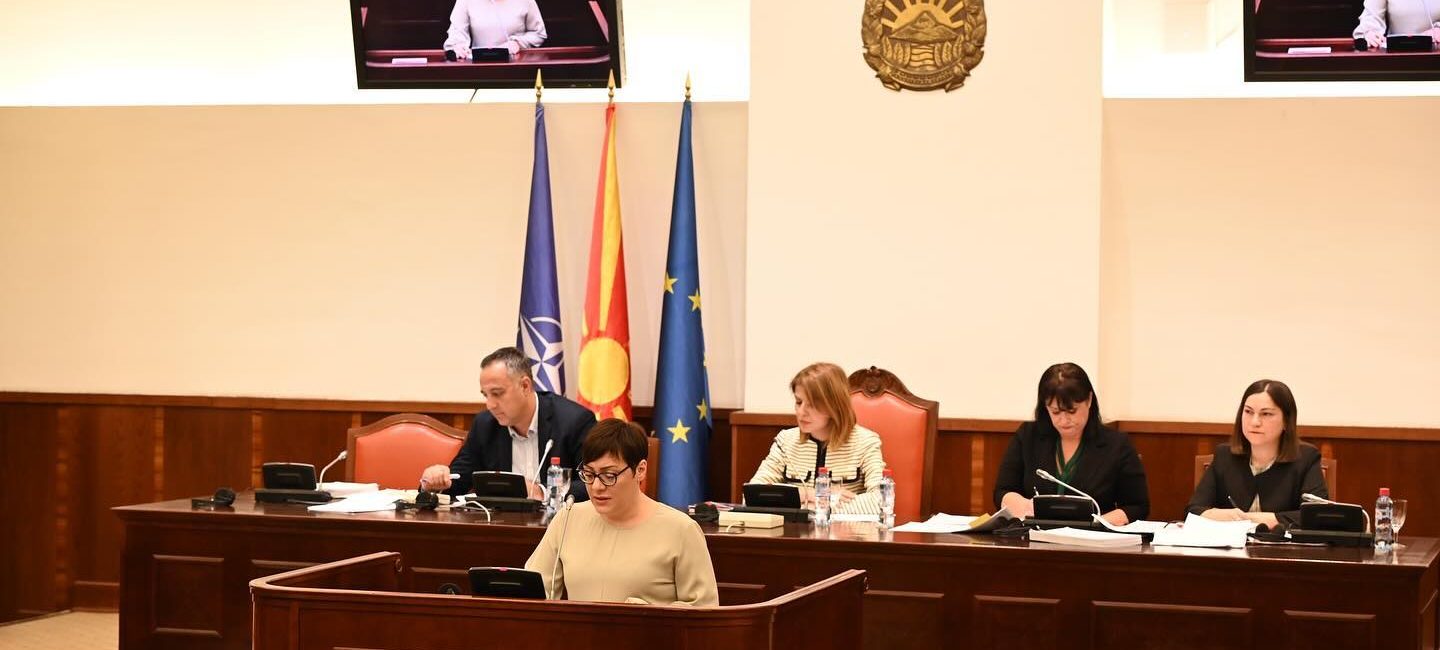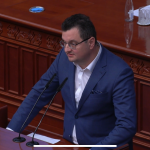14th November 2024, Skopje – 2025 Budget predominantly includes development component, underpinned by funds projected for capital projects, municipal projects, and as support for the business sector. This Budget brings about changes in managing the public finances, being only one segment of the new concept, we are implementing in practice, which is based upon fiscal consolidation and investments in support of intensified economic growth, Minister of Finance, Gordana Dimitrieska-Kochoska stated when elaborating on the 2025 draft Budget before the Financing and Budget Commission.
“2025 draft Budget is designed for the sake of fulfilling the commitment to carrying out fiscal consolidation and ensuring fiscal sustainability. Its reflection of the Government’s vision for next year is of crucial importance, which is based upon realistic macroeconomic assumptions and fiscal projections, thereby providing for smooth functioning of the institutions and the Government, as well as regular settlement of the liabilities.
Commitment to reducing the budget deficit, which will be lower by 0.9 p.p. in 2025, as well as efficient revenue collection, via fight against informal economy and efficient absorption of all funds as most importantly, constituted the groundwork when designing the next year’s Budget. In other words, the purpose set was for budget funds collected on all bases, to be efficiently employed, thus yielding greatest positive effects. Accordingly, institutions with own revenues at their disposal, are urged to employ them. As of 12th November inclusive, the funds at the disposal of all budget users, amount to over Denar 14 billion, thus creating opportunity for financing far more projects, which contribute to the country’s development”, Minister said.
She added that as a result of this new concept, next year will be marked by expanded stabilization of the macroeconomic developments and intensified economic growth, coupled by our commitment to attain, in the medium run, economic growth rates of 5% on average, as well as budget deficit and public debt in line with the fiscal rules.
“Such vision is not based upon a wish list, but it rather reflects the performance, particularly the one delivered in the second half of 2024. Growth is based upon actual implementation of a solid investment cycle, underpinned by high amount of capital expenditures as projected in the draft Budget, along with a series of measures and policies in support of efficient absorption of the projected funds. In addition to the investments made in the public sector, the development component will also be upheld via the planned investment cycle by the private sector, to be supported by the Government through the proceeds from the Hungarian Loan Facility provided under favorable terms and conditions, as well as the local projects, which will be implemented by the municipalities”, Minister pointed out, thereby adding that the GDP growth is projected at 3.7%, with the inflation forecasted to account for 2.2%. What makes the 2025 draft Budget particularly distinct is the upward trend of expenditures being lower than the one of revenues, in other words, as per this Budget’s projections, revenues are higher by 13% with expenditures picking up by 10% compared to 2024, thus contributing to fiscal consolidation and budget deficit reduction by around Denar 3.3. billion”.
As per 2025 Budget, total revenues are projected in the amount of Denar 358.8 billion, whereby expenditures are projected in the amount of Denar 400.2 billion. Budget deficit is projected in the amount of Denar 41.3 billion or 4% of GDP, being lower by approximately Denar 3.3 billion.
“Thereby, when designing the 2025 Budget, we were guided by realistic budgeting, i.e. revenues and expenditures projected in amounts that actually allow for their collection and execution. Thereby, expenditures are primarily based upon more efficient use of operating resources, reduction of non-essential expenditures, as well as greater positive impact on the economic activity”.
As per 2025 draft Budget, funds are projected in the amount of Denar 505.5 billion as capital expenditures and Denar 349.6 billion as current expenditures, providing for regular payment of wages, regular payment of pensions and their increase, payment of social rights, agricultural subsidies, support for small- and medium-sized enterprises, support and subsiding of innovation activities, as well as targeted support for vulnerable categories of citizens and businesses.
Expenditures related to wage payment are projected in the amount of Denar 48.1 billion, increasing by 8%, with expenditures for goods and services being projected in the amount of Denar 26.2 billion, reducing by 0.5% in relation to the total expenditures. Denar 105.5 billion is projected for pension payment, thus providing the funds required for the announced pension increase by Denar 2,500 starting March next year. Around Denar 14.5 billion is projected for payment of social allowances, Denar 1.6 billion is provided for unemployment benefit, with Denar 2.3 billion being intended for implementing active employment policies and measures. Increased funds are provided for healthcare, projected in the amount of Denar 52.5 billion, increasing by 10.7%. Thereby, Health Insurance Fund of North Macedonia and Ministry of Health have own revenues at their disposal, being intended for healthcare. Agricultural support is projected in the amount of Denar 8 billion, with transfers to LGUs being projected in the amount of Denar 33.2 billion, being an increase by Denar 2.5 billion.
Capital expenditures are projected in the amount of around Denar 50.5 billion, thus creating preconditions for a new cycle of economic growth, while also ensuring substantial public investments, which are the basis for both improved economic perspectives and higher quality of life for the citizens. In addition to the considerable capital investments projected under the Budget, substantial amount of funds for project implementation is also provided under loans extended by international financial institutions and bilateral creditors, geared towards railway and utility infrastructure and waste management, energy efficiency in the public sector, as well as health, education, social services, agriculture, energy sectors and similar.
As per the draft Budget, it is foreseen for the budget deficit to be financed by making borrowing on both domestic and international market. In 2025, principal repayment on the basis of both external debt and domestic debt is in the amount of Denar 49.3 billion and Denar 16.9 billion, respectfully.
Under the Financing and Budget Commission, the debate upon the draft Budget lasts for 10 working days, followed by its consideration and adoption as supplemented draft Budget at a plenary session in the Parliament. 2025 Budget should be adopted by 31st December.
















